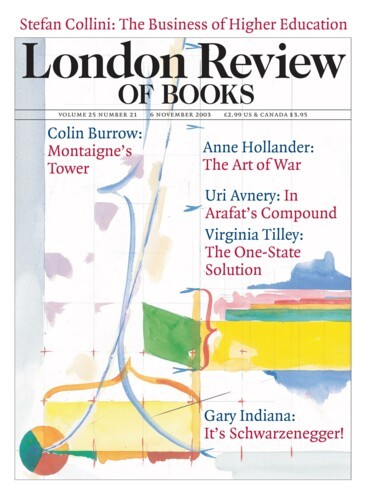What can best be called clear water has started showing, happily, between the Blair regime’s incommensurate ambitions in respect of new weaponry and its chances of being able to realise them. The two new aircraft-carriers that our visionary Government is hankering after in pursuance of the world role it feels obliged to play, won’t by all accounts be as big as it had hoped, because unless this tabled hardware is downsized there won’t be the money on hand to pay for it. Thousands of tons will have to be knocked off the projected displacement of warships which, the idea was, would have been approaching the gross dimensions of those American carriers, clips from the life on board which, both indoors and out, we’ve grown all too used to seeing on our screens every time they put to sea to engage in some offshore bombardment of the landmass. As floating icons of high-tech belligerence they are without compare, which is no doubt why, five months ago, we were treated to the unlovely sight of a triumphalist George Bush touching down on one such, flak-jacketed it goes without saying, perhaps for fear of an episode of friendly fire during his approach.
So why would our own starveling country want two more of these vagrant landing-strips, whatever the asking price may turn out to be? Two reasons come to mind, both unworthy. We want them because when you choose to go to war they allow you to conduct hostilities, in part at least, extra-territorially, launching air attacks from out to sea without there being any serious risk to those doing the launching and without having had to arrange beforehand for landing rights in countries that might not want to grant them: without, that is, the resort to diplomacy. And we want them because they are icons not just of belligerence but of a White Ensign nationalism, showing the flag around the globe when there isn’t a war to go to: gunboats writ very large indeed. What’s hard to imagine for them is a role closer to home, in defence of our island shores – bar maybe hull-down beyond the horizon on anti-missile watch during the seaside get-togethers of the Labour Party.
You might hope that we could in future save the odd billion and do without aircraft-carriers altogether, except that we have in office a Prime Minister hooked to an unholy degree on military action. ‘It is some feat to go to war five times in six years,’ are the opening words of John Kampfner’s Blair’s Wars (Free Press, £17.99). ‘That statistic impelled me to write this book.’ It’s good that Kampfner was impelled to write it because he has done an excellent job in going back, Blair war by Blair war, over the political history of how he, i.e. we, became involved in each of them and then went about waging it. I for one couldn’t put a time or a place right away to all five, but along with the interventions in Kosovo, Afghanistan and Iraq, Kampfner has rightly included the so-called Operation Desert Fox in Iraq in 1998, and the expedition to Sierra Leone in 2000. Some record for a Prime Minister who seemed such a thoroughgoing civilian six short years ago.
Blair doesn’t come at all well out of Kampfner’s book, which is forever putting him on the rack without having to do much more than spell out the unfavourable facts. A fair number of these were already public knowledge, but many others – and very telling they frequently are – have been extracted from unnamed insider sources. Once he’s reached almost to the present, Kampfner feels free to sum the evidence cruelly up, describing Blair in his closing lines as ‘a combination of naivety and hubris’. Both those qualities have been on display throughout a truly disturbing story, especially in Blair’s dealings with, first the Clinton and then the Bush Administrations. If he once saw himself as the European leader best qualified to talk to and help steer the White House, he has ended up as a Bush sound-alike whose once vaunted Europeanism looks utterly hollow. He appears from what Kampfner writes never to have noticed the humiliatingly little purchase he was having in Washington, mistaking as he did the flattery he received there face to face as a gauge of the influence on policy he anticipated would survive his physical presence. As an example of how he was sidelined, what could be worse than the events of 19 March this year, when the Americans launched an air attack on the Baghdad bunker that Saddam was supposedly hiding in? Blair wasn’t told it was happening: as the American rockets homed vainly in, he was watching the football on TV.
He will no doubt outlive the Report from the Hutton Inquiry once that is published, and meanwhile be scheming ways and means of stretching the defence budget to ensure that his aircraft-carriers are every bit as imperial as he requires them to be. The same can’t go, on the other hand, for the minister whose budget that is: Geoff Hoon should find, come January, that the arrester gear he’d been hoping to find deployed on the flight-deck has been removed and that, as they say on Match of the Day, he’s headed for an early bath.
Send Letters To:
The Editor
London Review of Books,
28 Little Russell Street
London, WC1A 2HN
letters@lrb.co.uk
Please include name, address, and a telephone number.

